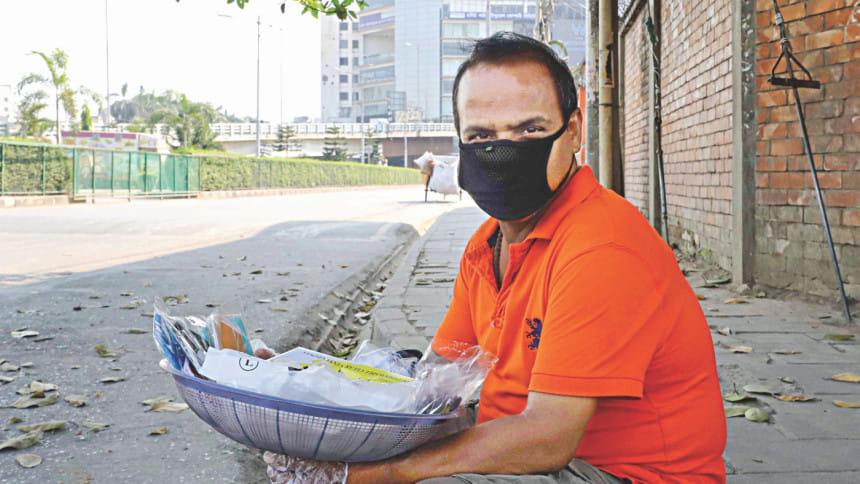Coronavirus: Are the policy and community responses adequate?

The government and the Bangladesh Bank have come up with several initiatives in response to the evolving public health and economic crisis.
Several of the initiatives pertain to flattening the spread curve of coronavirus while the others attempt to flatten the fattening of the economic costs curve due to social distancing measures.
How does the overall response package look like, taken together, and how adequate and well defined are the responses?
Flattening the curve
The measures introduced to flatten the spread curve include public holiday announced from March 26 to April 4, school closures, deployment of armed forces to enforce social distancing, closure of the Bangladesh Securities and Exchange Commission and the bourses in line with the closure of public offices.
The decision on whether to keep factories open or running has been delegated to the respective industry associations.
The general feeling is that these measures came a little late, though better than never.
The measures lacked internal consistency -- with some factories closed and some open, when the conventional wisdom is such middle grounds are self-defeating -- and they failed to anticipate the callous behavioural response from people covered, who chose to travel in crowded transports and went on vacation to tourism spots, thus exacerbating the transmission risk.
The deployment of the armed forces could be a lifesaver assuming they themselves have enough personal protection equipment.
FISCAL RESPONSE
The National Board of Revenue withdrew all duties and taxes on imports of medical supplies related to COVID-19 such as protective equipment and test kits.
The scarcity of isopropyl alcohol or ethanol has hindered the supply of enough hand sanitisers. The high duty on rectified spirits continues, thus discouraging its use for producing hand sanitisers and symbolising another policy inconsistency.
The recent announced fiscal response is in the right direction, though far from adequate.
The most significant in terms of the amount of financial resources is the Tk 5,000 crore -- which is equivalent to 0.2 per cent of fiscal 2018-19's GDP -- wage support to workers in the export-oriented industries.
Now, the Bangladesh Garment Manufacturers and Exporters Association claims that it pays Tk 4,000 crore in wages every month.
The Bangladesh Knitwear Manufacturers and Exporters Association probably pays an amount very similar.
Then there are the others: leather, footwear, furniture, ceramics and so on.
Most are demanding more than a months' basic pay.
How the announced amount will be rationed among all the different claimants in the export sector is not clear.
But rationing is inevitable since the total is well short of the wage bill in the exports sector.
It could be done on the basis of the number of workers in each export-oriented factory as a proportion of the total workers in the sector.
The difference between the public support and the monthly salary bills will have to be borne by the owners and perhaps the buyers.
More support is already being demanded by the industry leaders.
No support is available for deemed export, domestic market-oriented industries and those in services, who too are facing cash flow disruption due to the sudden stoppage of the wheels of the economy.
There is a lack of clarity in the support announced for the at-risk population dependent on the informal sector.
Facing the choice between death due to starvation and coronavirus infection leading possibly to death, they prefer the latter. This demonstrates once again that there is nothing more lethal than an empty stomach.
To them the risk of contracting coronavirus pales compared with the pain from starvation.
The government has indicated providing 6 months' free food, free shelter, free medicine for poor people without defining eligibility criteria, the financial allocations and the distribution mechanism.
Rice will be sold at a discounted price. The ministry of disaster management and relief has reportedly received more than 24,000 tonnes of food for distribution to the needy. But where and how -- are unclear.
The economically affected are spread all over the country. How will they be identified and reached? How will the delivery mechanism ensure that social distancing is not traded off in the process? How many will these assistance cover? As done in India, why not make cash transfers to the target groups through mobile financial services?
MONETARY RESPONSE
The BB has reduced the repo rate from 6 per cent to 5.75 percent and the cash reserve ratio from 5.5 per cent to 5 per cent. The latter is estimated to inject about Tk 6,500 crore liquidity into the banking system.
It has also committed to purchase treasury bills and bonds from the banks and the non-bank financial institutions (NBFIs) beyond those needed to meet the statutory liquidity requirement.
This will help counteract the disruption in recoveries due to a virtual moratorium on loan repayments to the banks and the NBFIs until June 30.
The banks that have rescheduled loans according to the new rescheduling policy will be allowed to keep 50 per cent of the provision required.
The BB also increased the repayment tenure of loans given out from the Export Development Fund (EDF) from three to six months. This will relieve pressure on cash outflows of the beneficiaries of EDF.
The monthly transaction limit using mobile financial services (MFS) has been increased to Tk 200,000 from Tk 75,000. No charge can be applied for person-to-person transfer.
Merchants cannot be charged for settling transactions of Tk 15,000 daily and Tk 100,000 monthly while selling medicines and other essential goods if they use debit or credit cards for payment.
Transaction limit using contactless debit and credit cards has been increased from Tk 3,000 to Tk 5,000 per day.
All these will facilitate the functioning of payments when restriction on movements outside home require limiting the number of transactions needed to make a payment.
The BB instructed banks to extend the tenure of realising export proceeds from four to six months.
Importers now have more time to make import payments with extension of the tenure of Letters of Credit to six months from the existing four months.
The period of back to back letters of credit opened under suppliers and buyers' credit has been extended up to a year from six months.
Banks are allowed to accept advance payments of up to $500,000 from typically $10,000 from businesses seeking to import COVID-19-related life-saving drugs and essential medical items, including kits and equipment.
The BB has allowed increasing the usance period for industrial raw materials up to 360 days from 180 days and the usance period for life-saving drugs to up to 180 days from 90 days.
All these will make trade financing easier and more flexible.
WHERE DO WE STAND?
Overall, both the fiscal and monetary responses described above are in the right direction, but not even remotely adequate.
They also lack clarity on the implementation modalities. The devil could be in these details. The fiscal response will not see the light of the day without working out the details. Time is of the essence here.
Many governments have introduced support packages equivalent to 8-10 per cent of GDP. Indian fiscal package constitutes 0.8 per cent of GDP.
Ours is hard to estimate because of the lack of clarity on the amount allocated for food, medicine and housing-based assistance. However, it is unlikely to be even close to that of India.
It is not fair to look only to government for support to deal with a crisis as ferocious and devious as the coronavirus, which has brought the entire global economy close to a standstill.
The financial and non-financial corporates have to come forward as well using their corporate social responsibility funds.
The established industries who are virtually living on profits should be willing to dig into their accumulated reserves to maintain their workforce. After all, social distancing has only artificially stopped the wheels of the economy.
While it may cause some permanent damage if it has to be continued too long, once the economy gets moving with relaxation of social distancing measures, the unleashing of the pent-up demand could lead to a business boom and thus help replenish the depleted reserves.
The well-off individuals should come forward with voluntary contributions to support the incomes of the workers and the self-employed in the informal sector.
The non-governmental organisations and the other social organisations need to deploy their institutional capacity in identifying and reaching the adversely impacted groups with social assistance.
Unfortunately, other than perhaps the cricketers, we are yet to see a significant community response comparable to what we have seen historically in times of floods, cyclones and food price shocks.
The government has to lead the effort and the rest of the society must chip in with cash, kind, skills and organising support to contain the spread of lethal virus, deal with the COVID-19 infected cases and cope with the economic fallout of social distancing.
The author is an economist

 For all latest news, follow The Daily Star's Google News channel.
For all latest news, follow The Daily Star's Google News channel. 



Comments